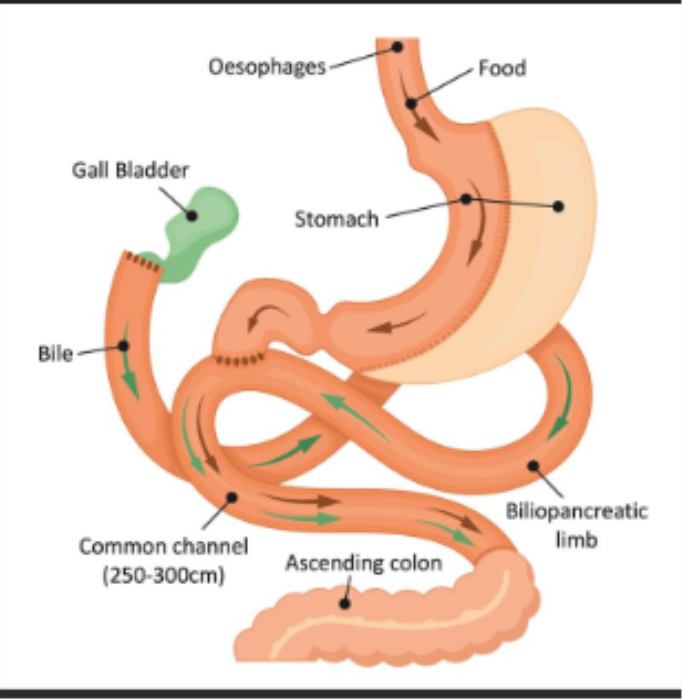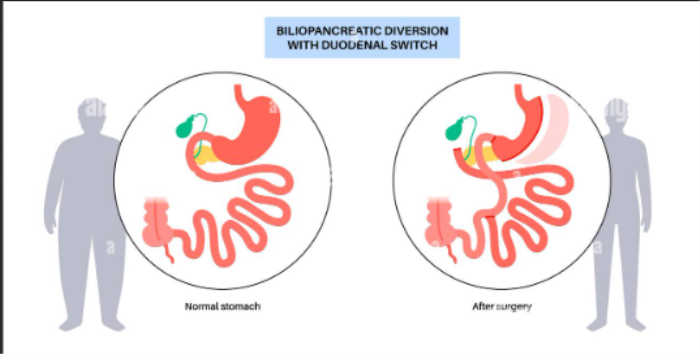Biliopancreatic Diversion with Duodenal Switch (BPD/DS) surgery in India offers innovative solutions for weight loss and metabolic conditions. With top hospitals and skilled bariatric surgeons, India provides world-class care and cost-effective solutions for both domestic and international patients seeking effective weight loss surgery.
Understanding Biliopancreatic Diversion with Duodenal Switch (BPD/DS) Surgery
What is Biliopancreatic Diversion with Duodenal Switch (BPD/DS) Surgery and How Does it Work?
Biliopancreatic Diversion with Duodenal Switch (BPD/DS) is a complex weight loss surgery that combines two procedures: a biliopancreatic diversion and a duodenal switch. The surgery involves removing a portion of the stomach and rerouting the small intestine to limit nutrient absorption, leading to significant weight loss and improved metabolic health.
Medical disclaimer: This content is for general awareness and does not replace a doctor’s consultation. For diagnosis or treatment decisions, consult a qualified specialist.
During BPD/DS surgery, surgeons create a small stomach pouch and connect it to the lower part of the small intestine, bypassing a large portion of the stomach and upper intestine. This approach limits calorie intake and nutrient absorption, resulting in substantial weight loss and improvement in obesity-related conditions.

When is BPD/DS Surgery Necessary?
BPD/DS surgery is typically recommended for individuals with severe obesity who have not achieved significant weight loss through other means, such as diet and exercise. It is also considered for patients with obesity-related health conditions like type 2 diabetes, hypertension, or sleep apnea, where other treatments have been ineffective.
Different Types of Weight Loss Surgeries
Different types of weight loss surgeries include sleeve gastrectomy, gastric bypass, and adjustable gastric banding. Each type of surgery addresses specific aspects of obesity management, with BPD/DS offering a more comprehensive approach for individuals with complex weight-related issues.
The BPD/DS Surgery Procedure
Pre-Surgery Evaluation Process
The pre-surgery evaluation process for BPD/DS surgery involves a comprehensive assessment, including medical history review, physical examinations, and advanced imaging techniques. This thorough evaluation helps determine the suitability of the procedure and ensures optimal outcomes.
Choosing the Right Type of Weight Loss Surgery
Choosing the right type of weight loss surgery depends on individual factors such as the patient's obesity severity, overall health, and specific medical conditions. Surgeons assess these factors along with patient preferences to recommend the most effective surgical approach for long-term weight management.
Detailed Surgical Procedure for BPD/DS Surgery
The detailed surgical procedure for BPD/DS involves general anesthesia, followed by making several small incisions for laparoscopic access. Surgeons then perform the stomach reduction and intestine rerouting. The procedure concludes with closing the incisions and monitoring the patient for recovery.

Post-Surgery Care and Recovery
Post-surgery care for BPD/DS includes pain management, dietary adjustments, and regular follow-up appointments. Patients are monitored for potential complications and are guided through a structured rehabilitation plan to ensure a successful recovery and weight loss maintenance.
Top Hospitals for BPD/DS Surgery in India
Leading hospitals for BPD/DS surgery in India include Apollo Hospitals Chennai, Fortis Memorial Research Institute Gurgaon, Max Super Specialty Hospital Delhi, and Narayana Health Bengaluru. These institutions are renowned for their advanced bariatric care and experienced surgeons.
Best BPD-DS Surgeons in India
India is home to several highly skilled surgeons specializing in Biliopancreatic Diversion with Duodenal Switch (BPD-DS). Among them, Dr. P. Jagannath, a renowned bariatric surgeon at the Lilavati Hospital in Mumbai, is noted for his expertise and successful patient outcomes. Dr. K. V. D. Venkatesh, based in Bangalore at Manipal Hospital, also has an impressive track record in performing complex weight loss surgeries, including BPD-DS. Furthermore, Dr. Ram Chuttani from Max Super Specialty Hospital in Delhi is celebrated for his minimally invasive techniques and personalized patient care, making him one of the top choices for BPD-DS surgery in India.
Success Rates and Survival Statistics for BPD/DS Surgery in India
Success rates for BPD/DS surgery in India are generally high, with many hospitals reporting over 80% success rates for significant weight loss and improvement in metabolic conditions. Positive outcomes are attributed to advanced surgical techniques and skilled medical professionals.
Legal and Ethical Considerations for BPD/DS Surgery in India
Legal and ethical considerations for BPD/DS surgery include ensuring informed consent, adhering to patient confidentiality, and complying with medical regulations. Hospitals must follow ethical practices, such as providing transparent information about risks and costs, and ensuring that all procedures are performed by qualified professionals.
Cost of BPD/DS Surgery in India
The cost of BPD/DS surgery in India typically ranges from ₹3,00,000 to ₹7,00,000. The final cost depends on factors such as the complexity of the procedure and the hospital's facilities. India's cost-effective solutions make it an attractive option for high-quality weight loss surgery.
Explore a detailed breakdown of biliopancreatic diversion with duodenal switch (bpd/ds) surgery cost in India by visiting our in-depth guide biliopancreatic diversion with duodenal switch (bpd/ds) surgery cost in India.
Preparing for BPD/DS Surgery
Lifestyle Changes Before BPD/DS Surgery
Lifestyle changes before BPD/DS surgery may include adopting a healthy diet, quitting smoking, and engaging in physical activity to improve overall health. Patients should also follow pre-surgery guidelines provided by their healthcare team to optimize surgical outcomes.
Medications and Treatments Required for BPD/DS Surgery Patients
Patients undergoing BPD/DS surgery typically require medications such as pain relievers, antibiotics, and supplements to manage pain, prevent infections, and ensure proper nutrient absorption. Post-surgery, medications may also include vitamins and minerals to support long-term health.
Importance of Support Systems and Counseling for BPD/DS Surgery Patients
Support systems and counseling are crucial for BPD/DS surgery patients, providing emotional support and guidance through the recovery process. A strong support network and access to professional counseling can significantly enhance recovery and help patients adjust to lifestyle changes.
Life After BPD/DS Surgery
Recovery Process After BPD/DS Surgery
The recovery process after BPD/DS surgery involves a combination of rest, dietary adjustments, and gradual return to normal activities. Patients should adhere to their surgeon’s rehabilitation plan, manage pain with prescribed medications, and attend follow-up appointments to monitor progress.
Long-term Care and Monitoring After BPD/DS Surgery
Long-term care and monitoring after BPD/DS surgery include regular follow-up visits with healthcare providers to track weight loss progress, manage any ongoing symptoms, and ensure nutritional needs are met. Patients should continue with prescribed dietary guidelines and periodic check-ups to maintain health and weight loss.
Potential Risks and Complications of BPD/DS Surgery
Potential risks and complications of BPD/DS surgery include nutritional deficiencies, gastrointestinal issues, and surgical complications. Careful pre-surgery evaluation and diligent post-operative monitoring help manage these risks and ensure a successful recovery.
Latest Advancements in BPD/DS Surgery
Minimally Invasive Techniques in BPD/DS Surgery
Minimally invasive techniques in BPD/DS surgery use smaller incisions and advanced imaging to reduce tissue damage and recovery time. These techniques, such as laparoscopic surgery, offer benefits like less postoperative pain, shorter hospital stays, and quicker return to daily activities.
Use of Robotics and Navigation Systems
The use of robotics and navigation systems in BPD/DS surgery enhances precision and reduces human error. Robotic-assisted surgery allows for more accurate placement of surgical instruments, while navigation systems provide real-time imaging to guide the surgeon, improving outcomes and minimizing complications.
Development of Advanced Surgical Implants
The development of advanced surgical implants focuses on improving durability and biocompatibility. Modern implants and devices offer enhanced stability and support, promoting better outcomes and reducing the risk of complications, contributing to more successful surgical results.
Frequently Asked Questions (FAQs) about Biliopancreatic Diversion with Duodenal Switch (BPD/DS) Surgery
What is the success rate of BPD/DS surgeries in India?
Success rates for BPD/DS surgeries in India are high, with effective weight loss and improvement in related health issues.
How long is the hospital stay after BPD/DS surgery?
Hospital stay typically ranges from 3 to 7 days, depending on the complexity of the procedure and the patient's recovery progress.
What is the cost of BPD/DS surgery in India?
The cost varies from ₹4 lakh to ₹10 lakh, influenced by the hospital and the specifics of the surgical approach.
What are the eligibility criteria for BPD/DS surgery?
Eligibility criteria include severe obesity, associated health conditions, and lack of success with other weight-loss methods.
What is the recovery time after BPD/DS surgery?
Recovery time is typically 4 to 6 weeks, allowing for gradual return to normal activities and adjustment to the new lifestyle.
What are the risks and complications associated with BPD/DS surgeries?
Risks and complications include infection, nutrient deficiencies, and gastrointestinal issues, which require careful monitoring and management.
How do I find a suitable hospital for BPD/DS surgery in India?
Finding a suitable hospital involves consulting with your doctor and researching top institutions with experienced bariatric surgeons.
What kind of post-surgery care is required after BPD/DS surgery?
Post-surgery care includes medication adjustments, regular follow-up visits, and adherence to a prescribed dietary plan.
Are BPD/DS surgeries covered by insurance in India?
Insurance coverage varies; some plans may cover BPD/DS surgeries, so it's essential to check with your insurance provider.
Where can I find support groups for BPD/DS surgery patients in India?
Support groups can be found through hospitals and online communities, offering valuable emotional support and shared experiences.